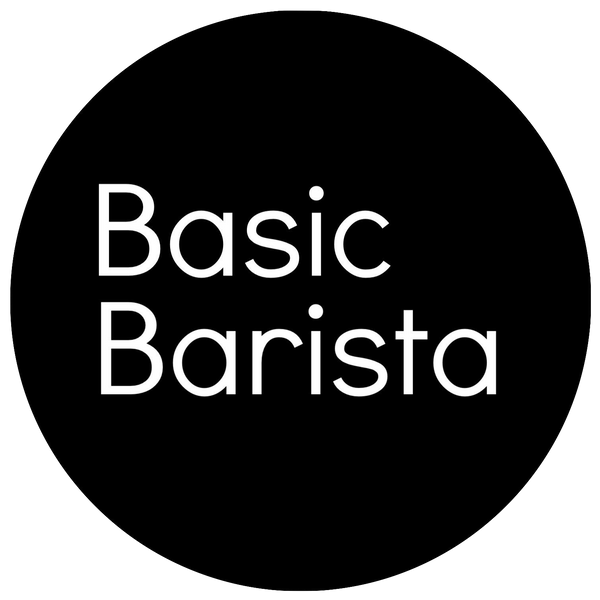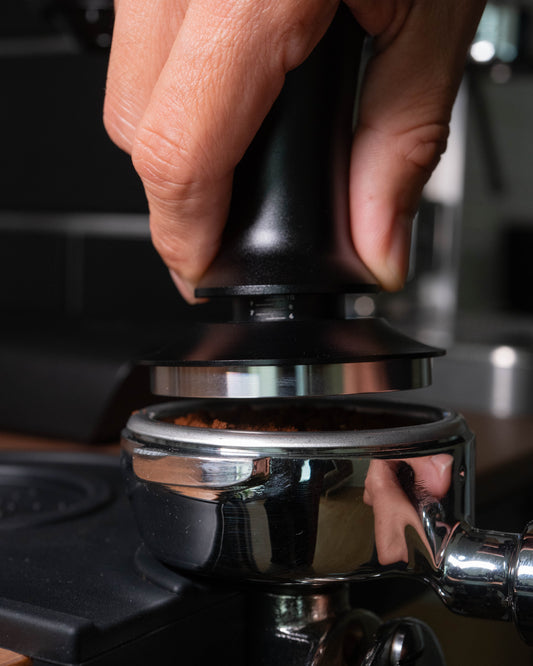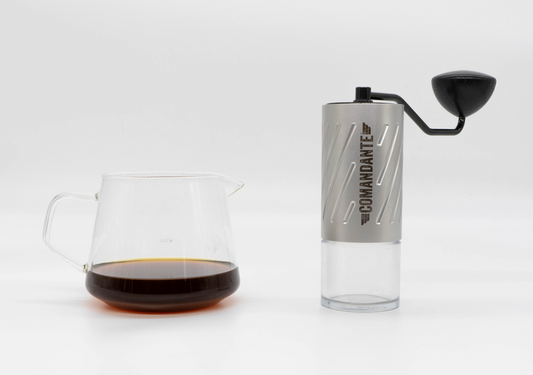
Toxik Bean Coffee Micro Roastery
Estimated read time: 6 minute
Share this article
I met Harry when I first started Basic Barista, he offered to drop off some coffee for me to try and I was so happy that he went out of his way to roast up some coffee, package it beautifully and to personally drop it off.
We spoke about his history in the hospitality industry, the trajectory of the hospitality industry (this was around the same time as Covid) so it really was a bit topic of discussion. And about my business, my plans and what started as a small friendly chat turned into almost a 3 year long coffee-mateship.
And so I was so happy that Harry agreed to be apart of our new blog series featuring different coffee roasters. We loved his answers and we hope that you find some value in this article as well!
How would you best describe your brand to someone who doesn’t know what you do?
Toxik Bean is a small batch coffee roastery that specialises in handcrafted, high-quality single origin coffee. We carefully source our beans from sustainable and ethical sources around the world through our importers, and roast them in small batches to ensure optimal flavour and freshness.
Our focus is on providing unique and complex flavour profiles that are both bold and nuanced, highlighting the natural characteristics of the beans. We take pride in our attention to detail throughout the entire roasting process, from selecting the beans to carefully monitoring the roast to achieve the perfect balance of flavour, aroma, and body. At Toxik Bean, we believe that coffee is an art form, and we are passionate about sharing our craft with others. Whether you prefer a rich and robust espresso roast or a smooth and fruity light roast, our diverse selection of single origin coffee beans has something for everyone.
So whether you're a coffee connoisseur or simply enjoy a good cup of coffee, come taste the difference that our small batch roastery makes.
What factors do you consider when selecting new green coffees to roast?
Origin:
Coffee beans are grown in different regions around the world, and each region has its own unique flavour profile based on factors such as climate, altitude, soil, and processing methods. Selecting coffee beans from specific origins that I know will produce a flavour profile that aligns with my personal as well as the customers' preferences.
Bean varietal:
Coffee beans come in different varietals, each with its own distinct flavour profile. I prefer certain varietals over others, depending on the flavours I want to highlight in my roasts.
Processing method:
There are several different methods used to process coffee beans after they are harvested, including washed, natural, and honey processes as general. Each method can produce a different flavour profile, and I may select sometimes beans based on the processing method that I prefer.
Quality:
I look for high-quality beans that are free of defects and have been carefully processed and stored. As we are a small batch roastery we don’t have the capability to work directly with farmers or cooperatives but I make sure that the beans I’m sourcing through my usual importers, meet my quality standards.
Sustainability and ethical sourcing:
Definitely are on my top priorities sustainability and ethical sourcing when selecting new green coffees to roast. I look for beans that importers have paid well above the fair trade standards and/or buying from farmers who use sustainable and environmentally friendly farming practices.
What made you first get into roasting coffee?
When I was in college, I worked part-time at a local coffee shop. I loved the smell of freshly roasted coffee beans and the process of brewing the perfect cup of coffee for customers. As I learned more about coffee, I became fascinated by the art and science of roasting. However, finishing my studies I followed totally different career mostly connected with them. One day, not too far back I decided to open a cafe. I can say that was my teenager years dream, at a much later time, and that’s how my journey in the coffee world started. While I was running the cafe I had the opportunity to attend a coffee cupping event where I tasted a variety of coffees from different regions and roasts.
The experience was eye-opening and sparked my curiosity about how different roasting techniques could impact the flavour of coffee. After that event, I started doing research on coffee roasting and experimenting with different roasting methods using a small home roaster. I became obsessed with the process of selecting green coffee beans, monitoring the roast, and tasting/cupping the final product to identify the flavours and aromas that were unique to each roast. As I shared my roasted coffee with friends and family, they were impressed with the quality and complexity of the flavours I was able to achieve.
Encouraged by their positive feedback, I decided to turn my passion into a business, completed some training close to other experienced roasters, and started Toxik Bean, a small-batch coffee roastery that specializes in handcrafted, high-quality coffees.

Can you tell us about your roasting process? What sets it apart from other coffee roasters?
One factor that can set a coffee roaster apart is their approach to the roasting process. The roasting equipment, in our case a small batch drum roaster and process have a significant impact on the flavour and aroma of the final product.
Another factor that set us as a roastery apart is the quality and sourcing of coffee beans. We focus on sourcing high-quality, sustainably grown beans, prioritising ethical sourcing practices. Then the origin, processing method, and roast level, that all impact the flavour and aroma of the coffee, are seriously taken in account in our roasting practice.
Finally, the skill and experience we have acquired have significant impact on the quality of the coffees we are roasting. We are carefully monitor the roast process to bring out the optimal flavour and aroma of the beans, while avoiding over-roasting or under-roasting. And having a deep understanding of the characteristics of different bean varietals, we are able to create unique and complex flavour profiles through our roasting techniques.
What is your process when creating a roast profile for a new coffee?
Creating a roast profile for a new coffee involves several steps that aim to optimise the flavour and aroma of the coffee while also ensuring consistency across multiple batches.
Here are my typical steps involved in creating roast profiles:
Sample Roasting:
The first step is to roast a small sample of the green coffee beans. This allows us to get a sense of the beans' natural flavours and aromas before developing the full roast profile.
Cupping:
The roasted coffee is then cupped, which is a professional tasting process that evaluates the coffee's aroma, flavour, body, aftertaste, sweetness and acidity. This helps us identify the specific characteristics of the coffee and what roast level will best enhance those flavours.
Development:
We will then begin to develop a roast profile based on the desired flavour and aroma of the coffee. This involves adjusting the roast time, temperature, and airflow to achieve the desired level of roast and to bring out specific flavour notes.
Roast Testing:
Once the roast profile is developed, we will conduct several test roasts to ensure consistency across different batches. We monitor the temperature and time throughout the roast to ensure that the coffee is roasted to the desired level.
Cupping and Tasting:
The roasted coffee is then cupped and tasted to ensure that the desired flavour profile has been achieved. If necessary, the roast profile may be adjusted and the process repeated until the desired flavour and aroma are achieved.
Finalising the Roast Profile:
Once the desired roast profile is achieved, we finalise the roast profile and ensure that it is documented and replicable for future batches.
Creating a roast profile for a new coffee is time-consuming process, but it is essential to ensuring that the coffee is roasted to its full potential and that the flavour profile is consistent across multiple batches.
What is your main goal with Toxik Bean?
The main goal of Toxik Bean specialty coffee roaster is to provide high-quality, unique and flavourful coffee to our customers. This involves sourcing high-quality green coffee beans, carefully roasting them to bring out their unique flavours and characteristics, and then delivering them to customers who appreciate and enjoy specialty coffee. Along with this, we also aim to build a loyal customer base, maintain high standards of quality and consistency, and contribute to the sustainability of the coffee industry through ethical sourcing and other initiatives.
How do you envision the future of the coffee industry, and what role do you see your business playing in it?
Generally speaking, the coffee industry is likely to continue evolving as consumers become increasingly interested in high-quality, sustainably sourced coffee. Some potential future trends in the industry may include increased adoption of specialty and single-origin coffees, greater emphasis on sustainability and ethical sourcing, and continued innovation in coffee brewing methods and technology.
For businesses like Toxik Bean Small Batch Roasters, playing a role in the future of the coffee industry might involve staying ahead of these trends and continuing to innovate and experiment with new flavours and roasting techniques. Additionally, it may involve working closely with coffee growers and other industry partners to ensure ethical and sustainable practices throughout the supply chain. Ultimately, the goal for businesses in the coffee industry should be to deliver high-quality, sustainable, and delicious coffee to customers, while contributing positively to the industry as a whole.







